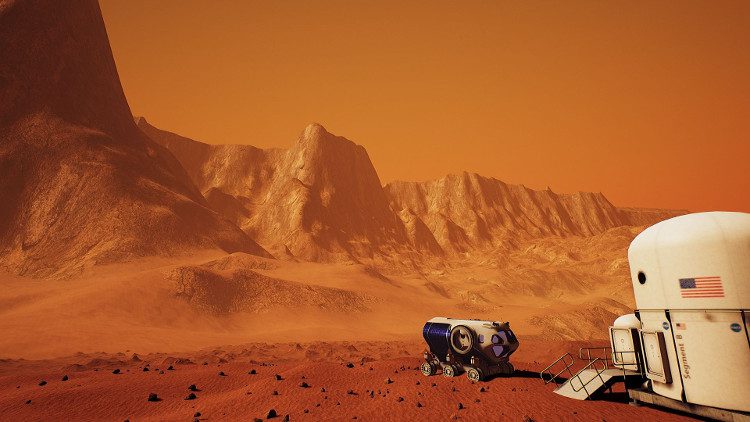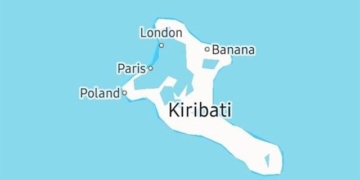Should we live on the Moon or Mars if humanity needs to move to another place outside of Earth?
The National Aeronautics and Space Administration (NASA) plans to send astronauts to Mars sometime in the 2030s. Meanwhile, the European Space Agency (ESA) has stated that scientists hope humans will one day take shelter in long-term underground caves on the Moon.
This brings us to an interesting debate: If humanity needs to relocate to a place beyond Earth, would it be better to live on Mars or the Moon?
Advantages of Mars

Mars may have more water than the Moon.
- A day on Mars is quite reasonable. A day there lasts about 24 hours, while a day on the Moon is equivalent to 28 Earth days, requiring gradual adaptation. Since the day on Mars is relatively short, the temperature difference between day and night is not as extreme, unlike the Moon where days are very hot and nights are extremely cold. The temperature difference between day and night on the Moon can reach up to 3,000 degrees Celsius.
- Mars has an atmosphere, though not very conducive for humans as it is filled with CO2. While this is great for plant life, it poses risks to human beings. The atmosphere allows winds to blow, helping to moderate the temperature differences between day and night, but it generates a lot of dust. Having an atmosphere is certainly better than none, as on the Moon. Thus, the Moon cannot protect you from being scorched, and you would have to live in caves. On Mars, you could live on the surface, although you would still be exposed to solar radiation.
- Mars may have more water than the Moon. There are only a few places on the Moon where water is accessible, while water may exist beneath the surface throughout Mars. Although this is not a certainty, it is a significant possibility. Of course, Mars does not have much breathable oxygen, but neither does the Moon. However, we can produce oxygen from water. Therefore, sustaining life would be easier on Mars due to more accessible water. On the Moon, we might have to live near the poles to avoid the temperature extremes between day and night.
- The gravity on Mars is much greater than that on the Moon. This helps retain the atmosphere and keeps everything anchored to the ground, which also contributes to stronger bones.
- Mars is not as hot as it seems despite its red color. There is a hypothesis that life originated on this planet and was then transported to Earth, where it flourished. Therefore, if you are interested in science, it is clear that Mars is the more appealing option.
Advantages of the Moon

The Moon is closer to Earth and orbits around it.
- The Moon is closer to Earth and orbits around it, so we do not have to leave the Earth’s surrounding system if we live on the Moon. This saves a lot of fuel (and money). We currently have rockets capable of carrying many things to the Moon. While we also have rockets to send some items to Mars, they are very limited. There have been talks about a mission to bring back samples from Mars, but NASA canceled it because it would cost up to $20 billion, and we can frequently retrieve rocks from the Moon. It is quite challenging to bring large items to Mars, whereas doing so for the Moon is much easier.
- It only takes 3 days to reach the Moon, while it takes up to 6 months to get to Mars, and you can only do so every two years. If you miss the 2-week launch window to Mars, you must wait another 2 years. During these two weeks, we can travel to the Moon and back. If a rescue is needed from the Moon, it would only take a few days, whereas it would take years from Mars. Additionally, if you want to communicate with someone on the Moon, the delay is just a few seconds, while for Mars, it ranges from 4 to 24 minutes, depending on whether Mars is on the same side of the Sun as Earth or on the opposite side.
- Since the Moon is much smaller than Mars, it is easier to land items on its surface and into orbit. In fact, transporting goods from the Moon to Earth is very inexpensive. Therefore, if we mine on the Moon, we can easily bring resources back to Earth. Mining on Mars would be significantly more costly to transport resources back. Thus, turning the Moon into a colony seems to offer more economic value.
- Remember it takes 6 months to get to Mars? That’s in a tiny spacecraft in the vastness of space. If an event were to occur in the solar system that significantly increased radiation (which happens quite frequently), you would die unless there is excellent radiation shielding on the spacecraft. The journey from Earth to the Moon is also fraught with challenges, but it only takes 3 days to get there, making it much easier to avoid periods when solar system events could occur.
In summary, Mars is a great option and may sustain life better, offering greater scientific exploration opportunities, while the Moon is a more economically viable location for colonization. Therefore, Mars will remain a distant dream for the future unless there are changes in financial and political conditions.
If something unfortunate were to happen on Earth, and this place could no longer sustain life, then Mars might be a better place to live due to the higher likelihood of finding water, stronger gravity, and an atmosphere. Meanwhile, the Moon seems too harsh and can only be regarded as a stepping stone towards the future.





















































